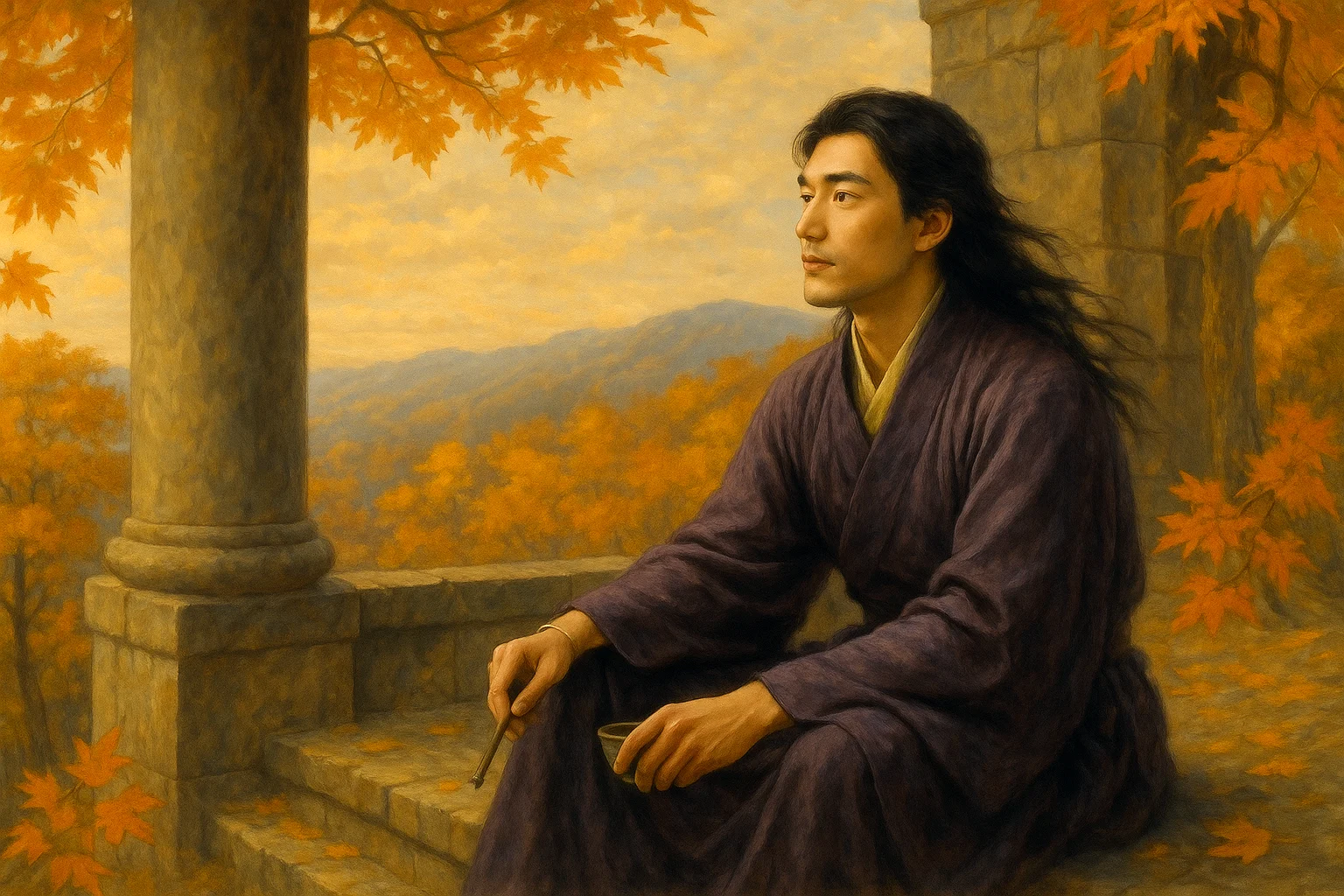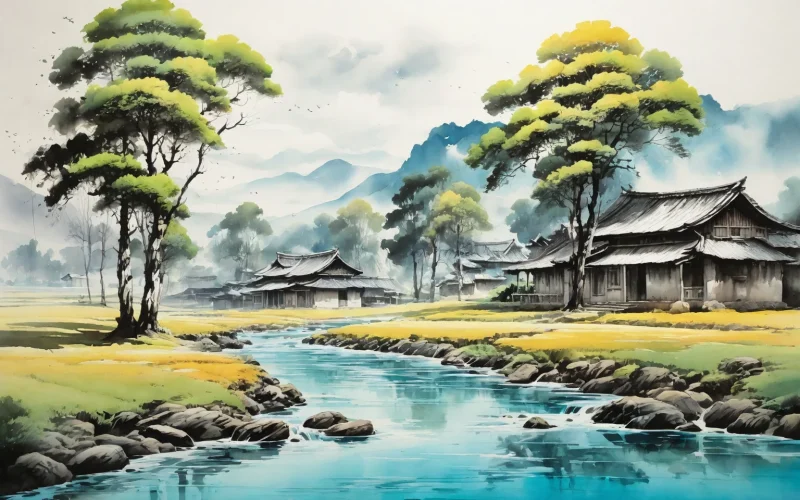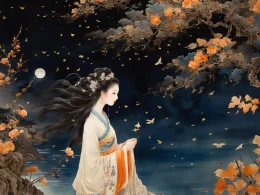Sun-glaze floats on wild waters clear,
Grass-green melts into skies austere.
Hills stand unchanged mile on mile,
Yet yearly life shifts its style.
Leisured fields beyond lone forts lie,
Scorching rains from lone clouds sigh.
My heart grieves worldly dust so deep,
No way to visit where fishers sleep.
Original Poem
「夏日寄东溪隐者」
耿玮
日华浮野水,草色合遥空。
处处山依旧,年年事不同。
闲田孤垒外,暑雨片云中。
惆怅多尘累,无由访钓翁。
Interpretation
Composed in midsummer, this poem finds Geng Wei immersed in nature's beauty while longing for a hermit's life. The "Recluse of East Stream" may refer to an old friend dwelling in mountain solitude, or perhaps an idealized embodiment of reclusion. Amid worldly clamor, the poet thinks of this distant figure in quiet woods, his heart swelling with envy and yearning. Part epistolary verse, part self-portrait, these lines articulate Geng Wei's weariness with mundane affairs and his thirst for retreat into nature.
First Couplet: "日华浮野水,草色合遥空。"
Rì huá fú yě shuǐ, cǎo sè hé yáo kōng.
Sunbeams dance on the wild stream's face,
Grass-green dissolves into sky's embrace.
The couplet paints a radiant summer panorama. Glittering water and endless verdure merge earth with heaven in serene harmony. This pristine natural tableau—clear and luminous—sets the stage for the poet's reclusive aspirations.
Second Couplet: "处处山依旧,年年事不同。"
Chǔ chù shān yī jiù, nián nián shì bù tóng.
Mountains stand changeless mile on mile,
While human fortunes shift each while.
Here scene yields to reflection. The eternal hills contrast with life's ceaseless flux. "Changeless" (依旧) versus "shift" (不同) captures both nature's permanence and the poet's quiet resignation to life's impermanence—a classical tension in Chinese wilderness poetry.
Third Couplet: "闲田孤垒外,暑雨片云中。"
Xián tián gū lěi wài, shǔ yǔ piàn yún zhōng.
Past abandoned fields, beyond lone forts,
A summer shower from drifting cloud sports.
Now focusing on the recluse's environs: desolate farmlands and solitary structures frame a landscape of sublime isolation. The "drifting cloud's" (片云) ephemeral rain epitomizes the hermit's existence—unfettered, cooling, transient yet renewing. These images crystallize the allure of withdrawal.
Fourth Couplet: "惆怅多尘累,无由访钓翁。"
Chóu chàng duō chén lèi, wú yóu fǎng diào wēng.
Melancholy binds me to worldly chains,
Barred from visiting that angler of rains.
The conclusion voices poignant frustration. Though yearning for the fisherman-recluse's life (a nod to Zhuangzi's ideal), the poet remains shackled by obligations. This "barred" (无由) state transcends physical impossibility to symbolize the universal tension between spiritual aspiration and earthly entanglements—Geng Wei's essential dilemma.
Holistic Appreciation
Geng Wei opens with the serene beauty of summer scenery, transitions to the recluse's secluded dwelling, and finally returns to his own worldly entanglements—blending scene and emotion with effortless fluidity. The poem's language is understated, its mood detached, appearing leisurely yet tinged with sorrow—a hallmark of Mid-Tang landscape poetry that "expresses emotion through stillness and ideals through objects." While vividly depicting the mountains' cool tranquility, the verses simultaneously betray the poet's discontent and resignation toward his circumstances. This interplay between yearning for reclusion and melancholy over mortal constraints reflects Geng Wei's inner truth, aligning with his signature sparse style and contemplative spirit.
Artistic Merits
- Emotion Woven into Scenery, Blending Real and Ideal: The recluse's natural surroundings become a vessel for the poet's own desire to escape worldly chaos.
- Stark Contrast, Unified Reason and Sentiment: Juxtaposing "unchanging mountains" with "altered affairs" underscores nature's permanence against life's transience.
- Sparse Language, Profound Meaning: The deceptively simple diction carries resonant depth, embodying an aesthetic of "subtle richness within restraint."
- Open-Ended Closure, Lingering Resonance: The final sigh of melancholy is delicately implied, leaving enduring emotional reverberations.
Insights
The poem reminds us that even amid life's clamor, one can nurture an inner sanctuary. Though the poet never reaches "East Creek," his longing for nature's purity and freedom finds catharsis in verse. This ideal of "aspiring where feet cannot tread" mirrors Tang literati's transcendence of earthly constraints through spiritual pursuit. It affirms that however bound by worldly nets, we may always carve a hidden path to mountainous serenity within.
About the poet

Geng Wei (耿湋, dates unknown), a Tang dynasty poet from Yongji, Shanxi, was among the "Ten Great Talents of the Dali Era." Renowned for his mastery of five-character regulated verse, his poetry is distinguished by its economical diction and tranquil imagery. While the prevailing style of Dali poetry tended toward austerity and desolation, Geng Wei developed a distinctive voice marked by understated naturalism.











